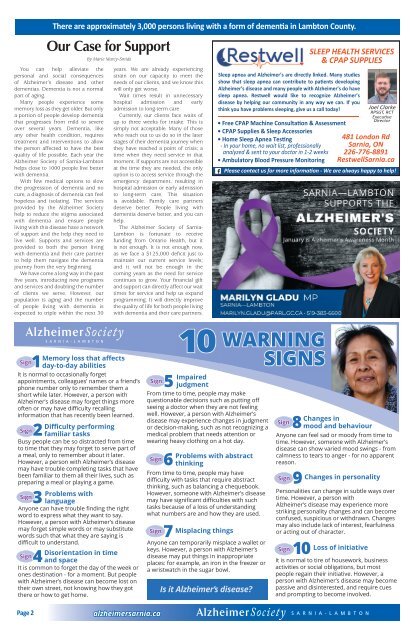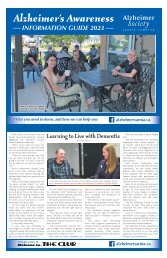Alzheimer Information Guide Winter 2024
The Alzheimer Society is seen as a resource in the area for those living with dementia and caregivers. Our success is significantly due to the desire to work collaboratively with other organizations. We aspire to be a leader in the development of best practices in dementia care. Our programs and services promote wellness and social inclusion.
The Alzheimer Society is seen as a resource in the area for those living with dementia and caregivers. Our success is significantly due to the desire to work collaboratively with other organizations. We aspire to be a leader in the development of best practices in dementia care. Our programs and services promote wellness and social inclusion.
You also want an ePaper? Increase the reach of your titles
YUMPU automatically turns print PDFs into web optimized ePapers that Google loves.
There are approximately 3,000 persons living with a form of dementia in Lambton County.<br />
Our Case for Support<br />
You can help alleviate the<br />
personal and social consequences<br />
of <strong>Alzheimer</strong>’s disease and other<br />
dementias. Dementia is not a normal<br />
part of aging.<br />
Many people experience some<br />
memory loss as they get older. But only<br />
a portion of people develop dementia<br />
that progresses from mild to severe<br />
over several years. Dementia, like<br />
any other health condition, requires<br />
treatment and interventions to allow<br />
the person affected to have the best<br />
quality of life possible. Each year the<br />
<strong>Alzheimer</strong> Society of Sarnia-Lambton<br />
helps close to 1000 people live better<br />
with dementia.<br />
With few medical options to slow<br />
the progression of dementia and no<br />
cure, a diagnosis of dementia can feel<br />
hopeless and isolating. The services<br />
provided by the <strong>Alzheimer</strong> Society<br />
help to reduce the stigma associated<br />
with dementia and ensure people<br />
living with this disease have a network<br />
of support and the help they need to<br />
live well. Supports and services are<br />
provided to both the person living<br />
with dementia and their care partner<br />
to help them navigate the dementia<br />
journey from the very beginning.<br />
We have come a long way in the past<br />
five years, introducing new programs<br />
and services and doubling the number<br />
of clients we serve. However, our<br />
population is aging and the number<br />
of people living with dementia is<br />
expected to triple within the next 30<br />
By Marie Marcy-Smids<br />
years. We are already experiencing<br />
strain on our capacity to meet the<br />
needs of our clients, and we know this<br />
will only get worse.<br />
Wait times result in unnecessary<br />
hospital admission and early<br />
admission to long-term care<br />
Currently, our clients face waits of<br />
up to three weeks for intake. This is<br />
simply not acceptable. Many of those<br />
who reach out to us do so in the later<br />
stages of their dementia journey when<br />
they have reached a point of crisis; a<br />
time when they need service in that<br />
moment. If supports are not accessible<br />
at the time they are needed, the only<br />
option is to access service through the<br />
emergency department, resulting in<br />
hospital admission or early admission<br />
to long-term care. This situation<br />
is avoidable. Family care partners<br />
deserve better. People living with<br />
dementia deserve better, and you can<br />
help.<br />
The <strong>Alzheimer</strong> Society of Sarnia-<br />
Lambton is fortunate to receive<br />
funding from Ontario Health, but it<br />
is not enough. It is not enough now,<br />
as we face a $125,000 deficit just to<br />
maintain our current service levels;<br />
and it will not be enough in the<br />
coming years as the need for service<br />
continues to grow. Your financial gift<br />
and support can directly affect our wait<br />
times for service and help us expand<br />
programming. It will directly improve<br />
the quality of life for both people living<br />
with dementia and their care partners.<br />
SLEEP HEALTH SERVICES<br />
& CPAP SUPPLIES<br />
Sleep apnea and <strong>Alzheimer</strong>’s are directly linked. Many studies<br />
show that sleep apnea can contribute to paents developing<br />
<strong>Alzheimer</strong>’s disease and many people with <strong>Alzheimer</strong>’s do have<br />
sleep apnea. Restwell would like to recognize <strong>Alzheimer</strong>’s<br />
disease by helping our community in any way we can. If you<br />
think you have problems sleeping, give us a call today!<br />
• Free CPAP Machine Consultaon & Assessment<br />
• CPAP Supplies & Sleep Accessories<br />
• Home Sleep Apnea Tesng<br />
- In your home, no wait list, professionally<br />
analyzed & sent to your doctor in 1-2 weeks<br />
• Ambulatory Blood Pressure Monitoring<br />
Joel Clarke<br />
RPSGT, RCT<br />
Execuve<br />
Director<br />
481 London Rd<br />
Sarnia, ON<br />
226-776-8891<br />
RestwellSarnia.ca<br />
Please contact us for more informaon - We are always happy to help!<br />
Memory loss that affects<br />
Sign1<br />
day-to-day abilities<br />
It is normal to occasionally forget<br />
appointments, colleagues’ names or a friend’s<br />
phone number only to remember them a<br />
short while later. However, a person with<br />
<strong>Alzheimer</strong>’s disease may forget things more<br />
often or may have difficulty recalling<br />
information that has recently been learned.<br />
Difficulty performing<br />
Sign2<br />
familiar tasks<br />
Busy people can be so distracted from time<br />
to time that they may forget to serve part of<br />
a meal, only to remember about it later.<br />
However, a person with <strong>Alzheimer</strong>’s disease<br />
may have trouble completing tasks that have<br />
been familiar to them all their lives, such as<br />
preparing a meal or playing a game.<br />
Problems with<br />
Sign3<br />
language<br />
Anyone can have trouble finding the right<br />
word to express what they want to say.<br />
However, a person with <strong>Alzheimer</strong>’s disease<br />
may forget simple words or may substitute<br />
words such that what they are saying is<br />
difficult to understand.<br />
Disorientation in time<br />
Sign4<br />
and space<br />
It is common to forget the day of the week or<br />
ones destination - for a moment. But people<br />
with <strong>Alzheimer</strong>’s disease can become lost on<br />
their own street, not knowing how they got<br />
there or how to get home.<br />
10<br />
Impaired<br />
Sign5<br />
judgment<br />
From time to time, people may make<br />
questionable decisions such as putting off<br />
seeing a doctor when they are not feeling<br />
well. However, a person with <strong>Alzheimer</strong>’s<br />
disease may experience changes in judgment<br />
or decision-making, such as not recognizing a<br />
medical problem that needs attention or<br />
wearing heavy clothing on a hot day.<br />
Problems with abstract<br />
Sign6<br />
thinking<br />
From time to time, people may have<br />
difficulty with tasks that require abstract<br />
thinking, such as balancing a chequebook.<br />
However, someone with <strong>Alzheimer</strong>’s disease<br />
may have significant difficulties with such<br />
tasks because of a loss of understanding<br />
what numbers are and how they are used.<br />
Misplacing things<br />
Sign7<br />
Anyone can temporarily misplace a wallet or<br />
keys. However, a person with <strong>Alzheimer</strong>’s<br />
disease may put things in inappropriate<br />
places: for example, an iron in the freezer or<br />
a wristwatch in the sugar bowl.<br />
Is it <strong>Alzheimer</strong>’s disease?<br />
WARNING<br />
SIGNS<br />
Changes in<br />
Sign<br />
8<br />
mood and behaviour<br />
Anyone can feel sad or moody from time to<br />
time. However, someone with <strong>Alzheimer</strong>’s<br />
disease can show varied mood swings - from<br />
calmness to tears to anger - for no apparent<br />
reason.<br />
Sign Changes in personality<br />
9<br />
Personalities can change in subtle ways over<br />
time. However, a person with<br />
<strong>Alzheimer</strong>’s disease may experience more<br />
striking personality changes and can become<br />
confused, suspicious or withdrawn. Changes<br />
may also include lack of interest, fearfulness<br />
or acting out of character.<br />
Sign Loss of initiative<br />
10<br />
It is normal to tire of housework, business<br />
activities or social obligations, but most<br />
people regain their initiative. However, a<br />
person with <strong>Alzheimer</strong>’s disease may become<br />
passive and disinterested, and require cues<br />
and prompting to become involved.<br />
Page 2<br />
alzheimersarnia.ca

















